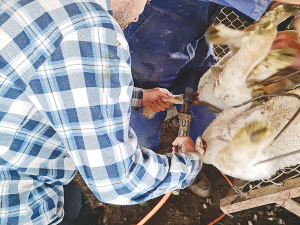Dairy power
OPINION: The good times felt across the dairy sector weren't lost at last week's Beef + Lamb NZ annual meeting.
 The docked tail must be no shorter than the distal end of the caudal fold - that's the end of the flaps of skin that attach the underside of the tail to the lamb's body.
The docked tail must be no shorter than the distal end of the caudal fold - that's the end of the flaps of skin that attach the underside of the tail to the lamb's body.
With docking - or tailing - underway in many areas, Beef+Lamb New Zealand is reminding farmers about the new tail length requirements.
Will Halliday, B+LNZ's senior advisor, animal welfare and biosecurity, says the length of the docked tail must be no shorter than the distal end of the caudal fold. That is the end of the flaps of skin that attach the underside of the tail to the lamb's body.
"This is the absolut minimum length under the new animal welfare regulations, which came into effect in May of this year."
Docking tails shorter than this can lead to an infringement fee of $500.
Halliday says a hot iron or rubber ring are the only methods that can be used to remove tails. He adds that using any other method can lead to a fine of $500.
"It is important farmers ensure their docking or tailing gangs are aware of what is required under the new regulations and the people removing the tails are adhering to that minimum length."
Only lambs under six months can be docked by a farmer or staff - any lambs older than six months must be done by a vet.
Docking a lamb over six months old is an offence with a fine on conviction of up to $3,000.
Could a breakthrough in fermentation create a new multi-million-dollar export market for shiitake mushroom extracts into China?
Meadow Fresh has created the world's first fantasy sports league powered by real cows.
This year, 'Foodie February' sees potatoes take the spotlight as one of New Zealand's most powerful and versatile food heroes.
A multi-cultural team is helping to establish one of New Zealand's largest plantings of premium eating grapes - while learning each other's languages and cultures along the way.
The World Wide Sires National All Day Breeds Best Youth Camp Best All Rounder plaudit has become family affair, with 2026 Paramount Cup winner Holly Williams following in her sister Zara's footsteps.
DairyNZ is giving New Zealand farmers a unique opportunity to gain hands-on governance and leadership experience within the dairy sector.

OPINION: Meanwhile, red blooded Northland politician Matua Shane Jones has provided one of the most telling quotes of the year…
OPINION: This old mutt has been around for a few years now and it seems these ‘once in 100-year’ weather…